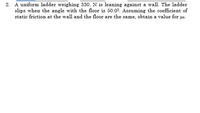
College Physics
11th Edition
ISBN: 9781305952300
Author: Raymond A. Serway, Chris Vuille
Publisher: Cengage Learning
expand_more
expand_more
format_list_bulleted
Concept explainers
Question
A uniform ladder weighing 330. N is leaning against a wall. The ladder slips when the angle with the floor is 50.00. Assuming the coefficient of static friction at the wall and the floor are the same, obtain a value for ms.

Transcribed Image Text:2. A uniform ladder weighing 330. N is leaning against a wall. The ladder
slips when the angle with the floor is 50.00. Assuming the coefficient of
static friction at the wall and the floor are the same, obtain a value for us.
Expert Solution
This question has been solved!
Explore an expertly crafted, step-by-step solution for a thorough understanding of key concepts.
This is a popular solution
Trending nowThis is a popular solution!
Step by stepSolved in 2 steps

Knowledge Booster
Learn more about
Need a deep-dive on the concept behind this application? Look no further. Learn more about this topic, physics and related others by exploring similar questions and additional content below.Similar questions
- A uniform ladder 10.o m long weighing 50.0 N rests against a smooth wall (no frictional force between ladder and wall). If the coefficient of static friction is .360 and makes a 60 degree angle with respect to the horizontal, what is the frictional force and how far along the ladder can a 70.0 kg painter climb before ladder begins to slip?arrow_forwardA straight rigid ladder of length 3.00 m leans against a frictionless vertical wall. The laddermakes an angle of 60.0° with respect to the horizontal floor. What is the minimum value of thecoefficient of static friction between the ladder and the floor that prevents the ladder from slipping?arrow_forwardOne end of a uniform 3.70-m-long rod of weight Fg is supported by a cable at an angle of 8 = 37° with the rod. The other end rests against the wall, where it is held by friction as shown in the figure below. The coefficient of static friction between the wall and the rod is μ = 0.535. Determine the minimum distance x from point A at which an additional object, also with the same weight For can be hung without causing the rod to slip at point A. g' 0 Barrow_forward
- Need help checking practice problems, image included. Thanks!arrow_forward2. A uniform ladder weighing 330. N is leaning against a wall. The ladder slips when the angle with the floor is 50.00. Assuming the coefficient of static friction at the wall and the floor are the same, obtain a value for us.arrow_forwardA ladder of length 12.0 m with a mass of 40.0 kg leans against a smooth wall. The ladder makes a 35.0o angle with the horizontal. Draw an adequate free body diagram of the ladder and determine the minimum coefficient of static friction between the ladder and the ground necessary to prevent the ladder from slipping.arrow_forward
- A ladder leans against a wall 5 meters above the ground so a homeowner can clear his gutters of leaves from last fall. The bottom of the ladder just begins to slip when it is 1.7 meters from the wall. What is the coefficient of static friction between the bottom of the ladder and the ground?arrow_forwardA stick which is 1.51 meters long is leaned against a wall at an angle. If the coefficient of static friction between the stick and the wall and floor is 0.395, determine the furthest distance from the wall that the bottom of the stick may be placed without slipping.arrow_forwardA fence post of mass m = 8 kg supports a fence with three lengths of barbed wire. The bottom wire is a distance d = 0.35 m from the ground and each wire is a distance 0.35 m above the previous one. Each of these three wires has the tension on it. For this problem, assume that the force exerted by these wires is purely horizontal. An additional guy wire is used to keep the pole upright with a tension of Fa = 490 N. The guy wire attaches to the post at a point h = 0.86 m above the ground and makes an angle of θ = 45 with respect to the horizontal. Write an expression for the tension in any one of the three fence wires. What is the normal force that the ground exerts upward on the post?arrow_forward
arrow_back_ios
arrow_forward_ios
Recommended textbooks for you
 College PhysicsPhysicsISBN:9781305952300Author:Raymond A. Serway, Chris VuillePublisher:Cengage Learning
College PhysicsPhysicsISBN:9781305952300Author:Raymond A. Serway, Chris VuillePublisher:Cengage Learning University Physics (14th Edition)PhysicsISBN:9780133969290Author:Hugh D. Young, Roger A. FreedmanPublisher:PEARSON
University Physics (14th Edition)PhysicsISBN:9780133969290Author:Hugh D. Young, Roger A. FreedmanPublisher:PEARSON Introduction To Quantum MechanicsPhysicsISBN:9781107189638Author:Griffiths, David J., Schroeter, Darrell F.Publisher:Cambridge University Press
Introduction To Quantum MechanicsPhysicsISBN:9781107189638Author:Griffiths, David J., Schroeter, Darrell F.Publisher:Cambridge University Press Physics for Scientists and EngineersPhysicsISBN:9781337553278Author:Raymond A. Serway, John W. JewettPublisher:Cengage Learning
Physics for Scientists and EngineersPhysicsISBN:9781337553278Author:Raymond A. Serway, John W. JewettPublisher:Cengage Learning Lecture- Tutorials for Introductory AstronomyPhysicsISBN:9780321820464Author:Edward E. Prather, Tim P. Slater, Jeff P. Adams, Gina BrissendenPublisher:Addison-Wesley
Lecture- Tutorials for Introductory AstronomyPhysicsISBN:9780321820464Author:Edward E. Prather, Tim P. Slater, Jeff P. Adams, Gina BrissendenPublisher:Addison-Wesley College Physics: A Strategic Approach (4th Editio...PhysicsISBN:9780134609034Author:Randall D. Knight (Professor Emeritus), Brian Jones, Stuart FieldPublisher:PEARSON
College Physics: A Strategic Approach (4th Editio...PhysicsISBN:9780134609034Author:Randall D. Knight (Professor Emeritus), Brian Jones, Stuart FieldPublisher:PEARSON

College Physics
Physics
ISBN:9781305952300
Author:Raymond A. Serway, Chris Vuille
Publisher:Cengage Learning

University Physics (14th Edition)
Physics
ISBN:9780133969290
Author:Hugh D. Young, Roger A. Freedman
Publisher:PEARSON

Introduction To Quantum Mechanics
Physics
ISBN:9781107189638
Author:Griffiths, David J., Schroeter, Darrell F.
Publisher:Cambridge University Press

Physics for Scientists and Engineers
Physics
ISBN:9781337553278
Author:Raymond A. Serway, John W. Jewett
Publisher:Cengage Learning

Lecture- Tutorials for Introductory Astronomy
Physics
ISBN:9780321820464
Author:Edward E. Prather, Tim P. Slater, Jeff P. Adams, Gina Brissenden
Publisher:Addison-Wesley

College Physics: A Strategic Approach (4th Editio...
Physics
ISBN:9780134609034
Author:Randall D. Knight (Professor Emeritus), Brian Jones, Stuart Field
Publisher:PEARSON